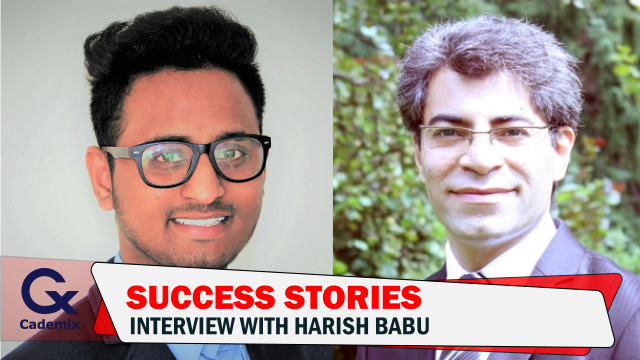Cademix Institute of Technology, Vienna, Austria | +43 650 967 7080 | info@cademix.org


Cademix Institute of Technology
Job seekers Portal for Career Acceleration, Continuing Education, European Job Market
People also visited:
Red Contact Lenses: Stylish Choices and Essential Safety Tips
Agile Management in Marketing for Rapid Business Growth
Exploring Career Opportunities in Optician Jobs: A Detailed Guide
20 Must-Have Business Stationery Mockup Items for Your Design Portfolio
Why "I Hire Optometry" Won't Get You the Job: Effective Job Search Tips for Optometrists
Streamlining the Recruitment Process with Chat-GPT: A Guide for HR Professionals
Comprehensive Guide to Mock Interviews: How to Prepare and Succeed in Job Interviews
Redefining the New German Experts: From Lifelong Specialization to Cross-Functional Skills
Innovative Marketing Strategies for Event Managers
SEO-Leistungsmetriken: Von Daten zur Strategie
The Role of Photovoltaics in Achieving Energy Independence
Critical Perspectives on Semiconductor Fabrication Processes and Optical Packaging in Quantum Integr...
Optometrist Employment: A Guide for International Job Seekers
Oasys Contact Lenses: A Detailed Review of Their Advantages and Disadvantages
Comprehensive Guide to Developing Interview Skills: How to Prepare and Succeed in Job Interviews
Walk-In Eye Exams: What to Look for and Critical Considerations
Optician Technician: A Comprehensive Guide to Roles, Responsibilities, and Career Path
Mastering Job Interviews with AI and GPT-4: Tips and Techniques for Success
Finding the Best Vision Centers Near Me: A Critical Review
The Importance of Sustainable Business in Today's World
Solution to 3D Printing Filament Clogging
Biofinity Contact Lenses: A Guide to Comfort and Performance
Agile management In Food Industry during Corona Pandemic
A Guide to Germany's Biggest Cities: Where to Study, Work and Explore!
People also visited:
A Game Theory Model of Opportunism Behavior in Auctions
Tailored Continuing Education: Challenges in Transitioning PhD Candidates to Sustainable Careers
Role of Augmented Reality in the Future of Design
Healthy Food Production Challenges in Developing Countries
Monthly Contact Lenses: Balancing Convenience and Vision Health
Nursing Ausbildung vs. University Pathway in Germany: Choosing the Right Route
Impact of Horizon Europe Framework on Circular Economy
Comprehensive Eye Care: A Complete Guide to Maintaining Healthy Vision
Phoropter - Essential Tool in Optometry
Astigmatism: Insights and Treatment Options
Comprehensive Guide to Resume Template Word Free Download: How to Choose and Use Them Effectively
A Comprehensive Review of Integrated Photonic Circuits (PIC) Design Methodologies for Quantum Comput...
SDG - Personal Experience
Legal Loopholes and Ethical Marketing: How Companies Can Navigate Content Boundaries
The Synergy of Human Skills and GPT-4o: Maximizing AI Potential
Understanding Your Eyeglass Prescription: A Comprehensive Guide
Revolutionizing HR: GPT for CV Analysis and Candidate Screening
Agile Project Management in Refineries Overhaul
Optometrist Job Positions in Europe
Investing in Agriculture: Exploring the FarmTogether Platform
Electrochemical Biosensors: Revolutionizing Point of Care Diagnostics- An Overview
Silicone Hydrogel Contact Lenses: Benefits, Features, and Considerations
1-Day Acuvue Moist Multifocal: Convenience and Clear Vision for Presbyopia
Exploring Contactlenses: A Detailed Look at Vision Correction and Eye Care
